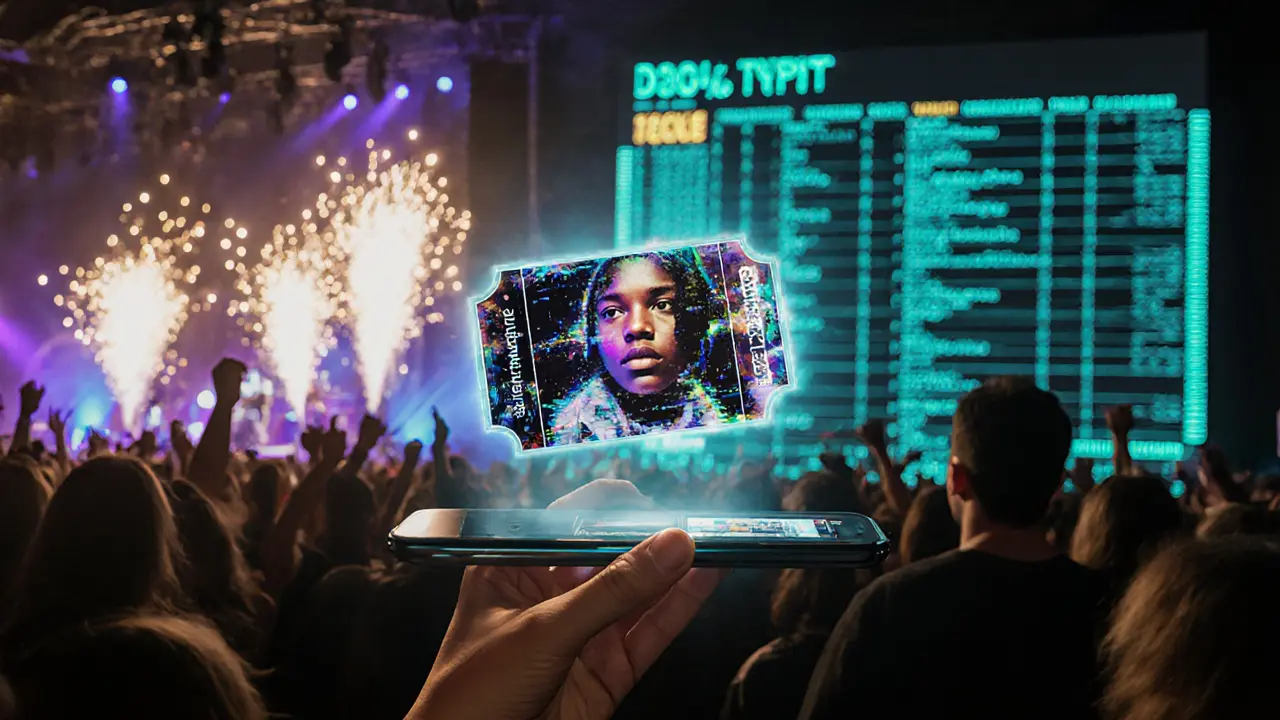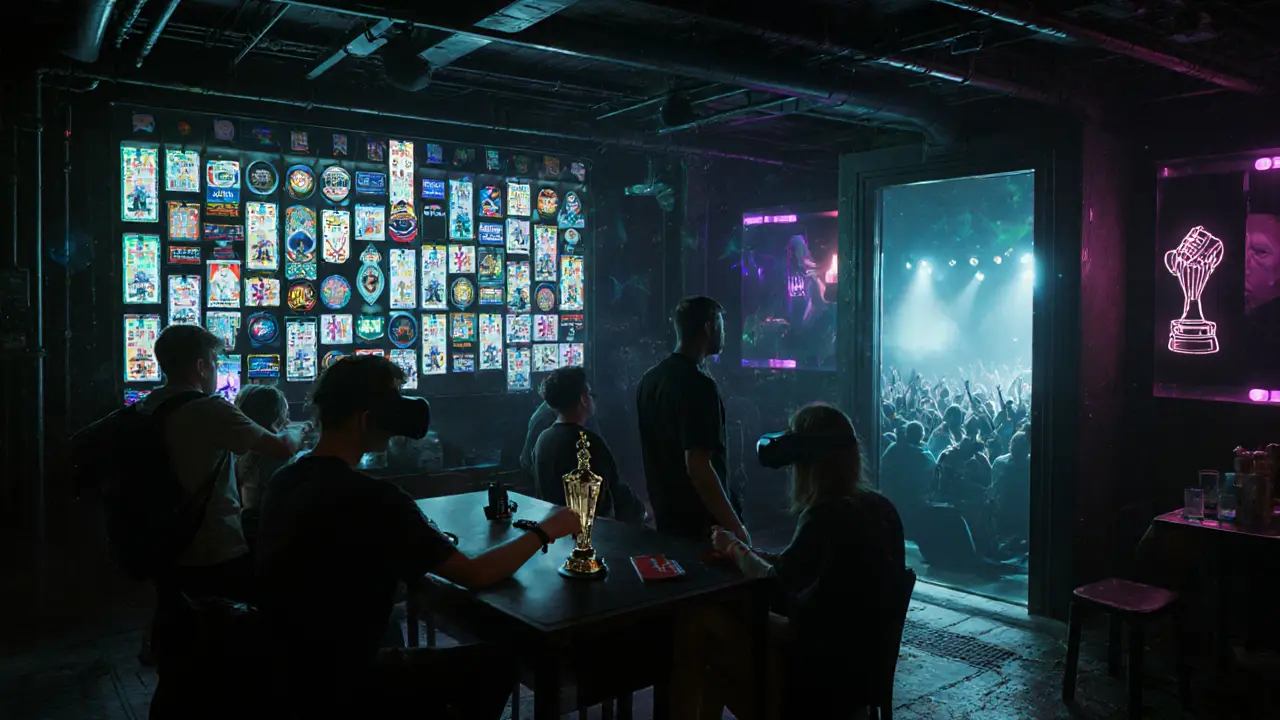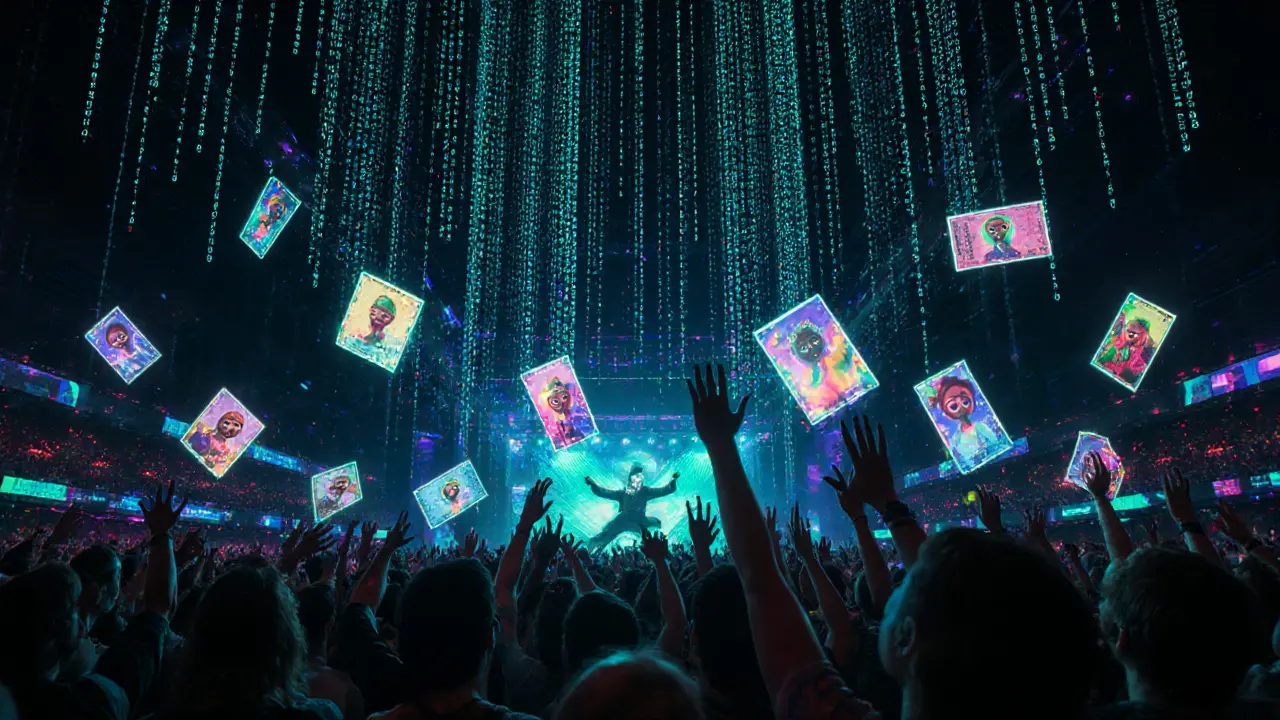NFT Ticket Royalty Calculator
NFT Ticket Royalty Calculator
Calculate potential earnings from NFT ticket royalties for artists and fans. The article explains how smart contracts automatically distribute royalties when tickets are resold.
Imagine buying a ticket to a concert and not just getting in - but walking away with a digital keepsake that grows in value, unlocks exclusive content, and even earns you money every time someone resells it. That’s not science fiction. It’s happening right now with NFT tickets.
What Are NFT Tickets, Really?
NFT tickets are digital assets stored on a blockchain. Unlike regular e-tickets you download or print, each NFT ticket is one-of-a-kind, verifiable, and owned by you - permanently. Think of it like a digital collectible that also gets you into a show. Once you buy it, it lives in your crypto wallet. No paper. No app. No fear of losing it. These aren’t just passes. They’re membership cards, memorabilia, and revenue generators rolled into one. Every time someone resells your ticket on the secondary market, you - or the event organizer - can earn a cut. That’s because smart contracts, self-executing code on the blockchain, can be programmed to send royalties automatically. No middlemen. No hidden fees. Just transparent, automatic payouts.Why Fans Love Them
For fans, NFT tickets mean more than entry. They mean belonging. After the show ends, the ticket doesn’t disappear. It becomes part of your digital collection. Some events give out special NFTs during the event - like a moment when the artist drops to their knees and the crowd roars. That exact second gets turned into a short video clip, minted as an NFT, and sent to everyone in the crowd who had the ticket. You didn’t just watch it. You own a piece of it. Organizers use airdrops - free digital gifts sent to your wallet - to reward loyal fans. Maybe it’s early access to next year’s tickets. Or a limited-edition digital poster. Or a discount on merch. Some festivals even give out POAPs (Proof of Attendance Protocol tokens) - free NFT badges that prove you were there. Collect them over the years, and you unlock VIP treatment, backstage tours, or even voice votes on setlists. In 2024, EXIT Festival in Serbia started using NFT tickets across all its events. Fans didn’t just get in - they got exclusive behind-the-scenes footage, early merch drops, and access to a private Discord community. Attendance didn’t just go up. Fan loyalty skyrocketed. People weren’t buying tickets. They were joining a club.How It Stops Scalping and Fraud
Scalpers have ruined events for years. They use bots to buy hundreds of tickets the second they go on sale, then flip them for triple the price. With NFT tickets, that’s nearly impossible. Each ticket is tied to a specific wallet. If you try to resell it, the smart contract can block the sale unless it’s done through the official marketplace. Organizers can set price caps. They can require the original buyer to approve each transfer. Some even lock tickets to a fan’s ID for the first 30 days - meaning you can’t sell it right away. No bots. No fake tickets. No shady resellers. And because every transfer is recorded on the blockchain, you can trace a ticket’s entire history. Was it bought at face value? Did it change hands five times? Was it ever flagged as stolen? All visible. No more buying a ticket from a sketchy site only to find out it’s fake at the gate.
How Organizers Make More Money
NFT tickets don’t just fix problems - they create new revenue streams. First, there are royalties. Every time a ticket resells, the original seller - usually the artist or promoter - gets 5-15% automatically. That’s money they never saw before. In traditional ticketing, resales are a black market. With NFTs, it’s a controlled, profitable ecosystem. Second, collectors want these tickets. Artists are commissioning custom artwork for each year’s event. Think of it like limited-edition vinyl. Fans don’t just want to go to the show - they want to own the memory. Some NFT tickets have animated designs, sound clips, or even interactive elements. One band released tickets that changed color based on the crowd’s noise level during the concert. Fans now trade them like rare cards. Third, data. Every wallet interaction tells organizers something: Who buys early? Who attends every show? Who holds onto tickets for years? That’s gold for marketing. You don’t guess what fans want anymore. You know.Real Examples That Work
It’s not theory. It’s happening. - The NBA has been using NFT tickets since 2023. Fans get game highlights, player collectibles, and exclusive access to virtual watch parties. Some tickets even unlock real-world perks - like a free drink at the arena. - Coachella 2024 offered NFT tickets that came with a digital art piece from the festival’s main stage. Those who held the ticket for a full year got a free VIP pass to 2025. - A small indie band in Hobart started using NFT tickets last year. Their ticket sales jumped 40%. Why? Fans started reselling them - and the band earned $12,000 in royalties from secondary sales alone. Even local theaters and comedy clubs are testing it. One venue in Melbourne gives out free POAPs to anyone who attends a show. Those badges unlock discounts on snacks, early booking for next month’s lineup, and entry to a monthly livestream Q&A with the performers.
The Challenges - And How to Get Past Them
NFT tickets aren’t perfect. Some fans don’t know how to use a wallet. Others worry about crypto prices. And yes - there are still environmental concerns, though newer blockchains like Polygon and Solana use 99% less energy than older ones like Bitcoin. The fix? Simplicity. Many platforms now let you buy NFT tickets with a credit card. You don’t need to know what Ethereum is. You just get a link to your wallet after purchase. The wallet is pre-loaded. The ticket is ready. You don’t touch crypto unless you want to. For organizers, the biggest hurdle is education. You can’t just say, “Here’s your NFT.” You have to show people why it matters. A short video. A simple guide. A friendly chatbot in your app. That’s what makes the difference.The Future Is Always On
The old model of events was transactional: Pay. Show up. Leave. NFT tickets turn that into a relationship. You’re not just a customer. You’re a member. You’re part of a community that lasts beyond the event. Your ticket doesn’t expire. It evolves. Maybe next year, it unlocks a virtual concert with the artist. Or a private podcast. Or a chance to name a song on the new album. The technology is here. The tools are ready. The fans are eager. The question isn’t whether NFT tickets will become mainstream. It’s how fast you’ll adopt them before your competitors do.What Happens If You Don’t?
If you stick with paper or basic digital tickets, you’re leaving money on the table. You’re letting scalpers profit. You’re missing out on data. And worst of all - you’re letting your fans feel like they’re just passing through. Not part of something special. NFT tickets aren’t about blockchain for blockchain’s sake. They’re about giving fans something real - something they can hold onto, trade, show off, and feel proud of. That’s the future of live events. And it’s already here.Are NFT tickets the same as regular digital tickets?
No. Regular digital tickets are just files - you can copy them, lose them, or have them stolen. NFT tickets are unique digital assets stored on a blockchain. They’re owned by your wallet, can’t be duplicated, and come with extra perks like royalties, collectible art, and access to exclusive communities.
Do I need cryptocurrency to buy an NFT ticket?
Not necessarily. Most platforms now let you buy NFT tickets with a credit card. After purchase, the ticket is automatically sent to a wallet they create for you. You don’t need to understand crypto unless you want to resell it later.
Can I resell my NFT ticket?
Yes - but only under rules set by the event organizer. Smart contracts can allow resale, set price limits, or require approval. Often, the original seller gets a cut (like 10%) every time it’s resold. This stops scalpers from making huge profits while giving fans a fair way to recoup costs.
Are NFT tickets bad for the environment?
Early blockchains like Ethereum used a lot of energy, but most NFT ticketing now runs on eco-friendly networks like Polygon, Solana, or Tezos. These use less energy than sending an email. Many organizers now highlight their carbon-neutral choices to appeal to environmentally conscious fans.
What if I lose my wallet or forget my password?
If you lose access to your wallet, you lose access to your ticket - just like losing a physical ticket. That’s why platforms offer recovery options: email-based recovery, backup codes, or even family members as trusted contacts. Always set up recovery options when you get your first NFT ticket.
Can NFT tickets work for small events like local concerts or theater shows?
Absolutely. Many small venues are using simple NFT platforms that cost less than $100 to set up. The real benefit? Building a loyal fan base. Even a free POAP badge given after a show can turn a one-time attendee into a repeat customer. It’s not about scale - it’s about connection.
How do I know if an NFT ticket is legitimate?
Check the official event website or verified social media accounts for the ticket link. Never buy from third-party sites like eBay or Craigslist. Legit NFT tickets are only sold through the organizer’s official platform. You can verify ownership on a blockchain explorer like Etherscan or PolygonScan by pasting the ticket’s unique ID.
Will NFT tickets replace all other ticket types?
Not overnight. But they’re becoming the standard for major events - music festivals, sports, and premium theater. As tools get easier and costs drop, even small events will adopt them. The future isn’t paper or plain digital - it’s digital, collectible, and connected.


Rohit Sreenath
October 28, 2025 AT 19:38NFT tickets sound like a fancy way to make fans pay twice. First for the show, then for the digital trinket. If I wanted to collect digital junk, I'd play video games. This feels like capitalism with a blockchain sticker on it.
Sam Kessler
October 30, 2025 AT 16:38Let’s be real-this isn’t about fan engagement. It’s about surveillance capitalism repackaged as ‘collectibles.’ Every wallet interaction? Data mining. Every royalty? A paywall on your own memory. And don’t get me started on how these ‘eco-friendly’ chains still rely on centralized validators. This is just the next phase of corporate control disguised as innovation. The blockchain isn’t liberating you-it’s logging you.
Steve Roberts
November 1, 2025 AT 05:14Oh great. So now we’re supposed to be thrilled that we’re being turned into crypto investors just to see a band play? I went to a show to feel something, not to track the price of a JPEG on OpenSea. And don’t even get me started on the ‘loyalty’ angle-this isn’t loyalty, it’s coercion wrapped in glitter. If you’re not buying the NFT, you’re not ‘in the club.’ That’s not community. That’s a cult with a smart contract.
John Dixon
November 1, 2025 AT 08:35Wow. Just... wow. So you’re telling me that instead of handing over $200 for a ticket, I now have to hand over $200, plus learn how to use a wallet, plus worry about losing my private key, plus hope the artist doesn’t get canceled and the NFT becomes worthless? And you call this progress? I’d rather have a paper ticket I can throw in a drawer and forget about. At least then I didn’t have to trust a blockchain.
Brody Dixon
November 2, 2025 AT 08:21I get the skepticism, but I’ve seen this work in small venues. One guy I know bought an NFT ticket for a local jazz show, got a POAP, and now he’s been to every show for two years. He doesn’t care about reselling it-he just likes knowing he was there, and that the artist remembers him. It’s not about money. It’s about being seen. Maybe that’s worth something.
Patrick Rocillo
November 2, 2025 AT 22:34THIS IS THE FUTURE!!! 🚀🔥 I got my first NFT ticket for a livestream show last month and got a little animated clip of the singer winking at the crowd-now it’s my lock screen. I’ve already traded it for a merch discount and my friend’s jealous. We’re not just fans-we’re collectors, participants, co-creators. This isn’t tech, it’s magic with receipts. 🎶💎
Aniket Sable
November 4, 2025 AT 13:43man i dont know much about blockchain but i bought a ticket to a local band show last year and got a free digital poster. i printed it and hung it on my wall. my mom asked what it was and i said its from the concert. she said oh nice. thats all i needed. maybe its not about the tech, just the feeling
Santosh harnaval
November 4, 2025 AT 16:45In India, most people still use cash. NFTs? Too much noise. But the idea of keeping something from the event? That’s beautiful. A photo. A clip. A badge. That’s what matters. Not the blockchain. Just the memory.
Claymore girl Claymoreanime
November 5, 2025 AT 10:20Oh please. You think this is revolutionary? It’s just another way for rich artists to extract more from broke fans. And the ‘eco-friendly’ blockchains? Please. They still use servers. Still need power. Still need corporate infrastructure. You’re not saving the planet-you’re just being marketed a greener lie. This isn’t innovation. It’s exploitation with a white hat.
Will Atkinson
November 6, 2025 AT 06:11I really appreciate how this balances innovation with accessibility-buying with a credit card, recovery options, no crypto knowledge needed. It’s not about forcing people into tech; it’s about inviting them in gently. And the POAPs? Genius. They’re like digital souvenirs that don’t collect dust. I’ve got one from a comedy show I saw three years ago-it still makes me smile. That’s the real win.
monica thomas
November 6, 2025 AT 16:10While the technological framework appears promising, one must consider the socioeconomic implications for populations without digital literacy or access to secure financial infrastructure. The assumption that all attendees possess the requisite tools to engage with blockchain-based systems may inadvertently exclude marginalized communities. Furthermore, the long-term archival integrity of digital assets remains an unresolved concern. A thoughtful, inclusive rollout is essential to ensure equitable participation.